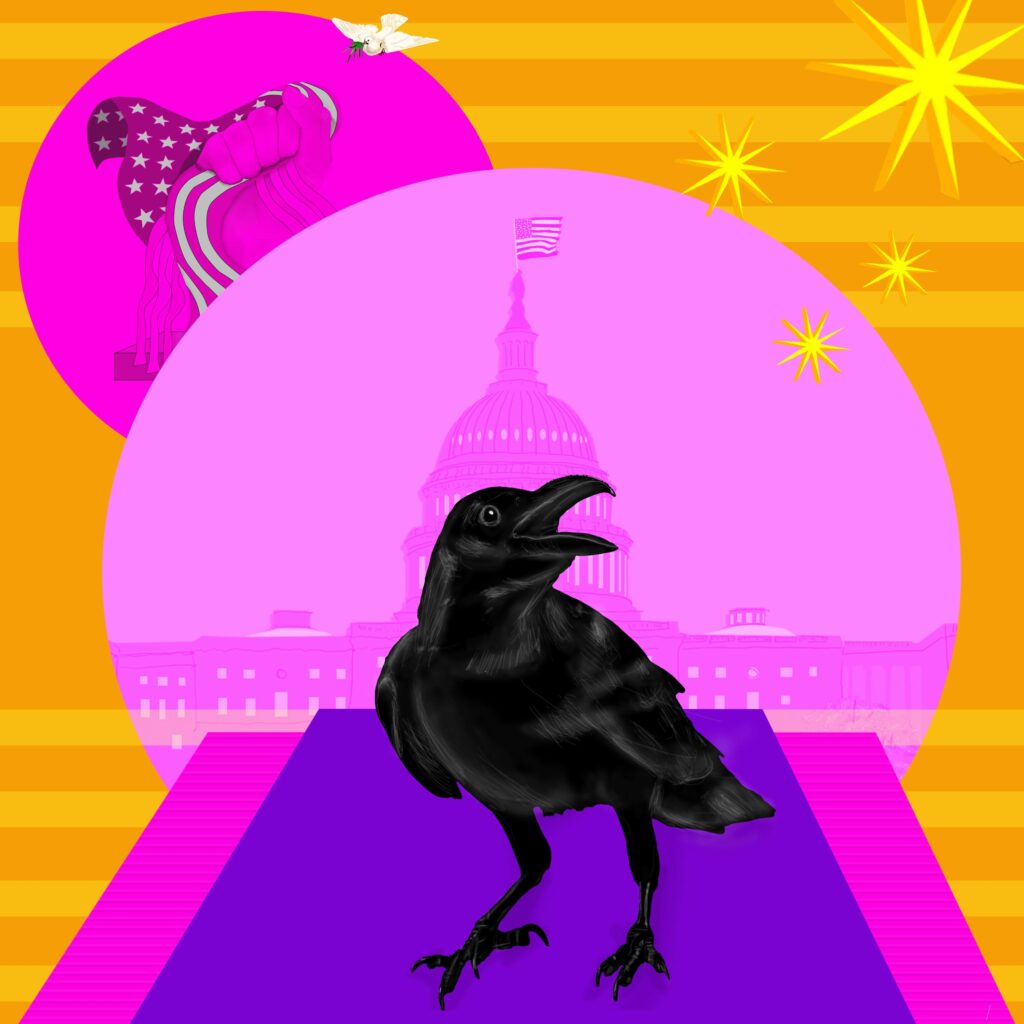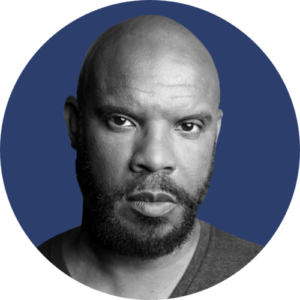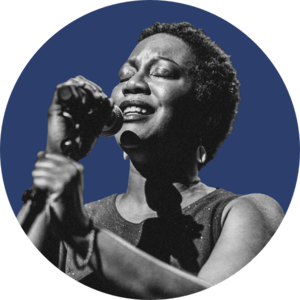
At the turn of the 20th century, Black southerners and their allies were in something of a holding pattern. They were experiencing the brick and mortar of Jim Crow, walling them off from their rights and liberty, being installed in real time. Racial terror killings had been climbing, lynchings were becoming more shocking and segregation was gaining traction.
And through all this Black people were still fighting, looking to make a way out of no way—to find a strategy for surviving the afterlife of slavery—so they could achieve the Promised Land of their ancestors’ dreams.
Black people had to decide what that “way” was going to be for them, and for Black folk beyond their lifetimes. And, they were not always in agreement.
View Transcript
Kidada E Williams: In 1895, the city of Atlanta hosted the Cotton States Exposition. It was “the A’s” turn on the stage, marking itself as the capital of the “New South.” They wanted to show the world that the region had successfully shifted to free labor. Booker T. Washington, one of the only Black men among the 3,000 or so white stakeholders, stepped to the stage. He started with a story.
Booker T. Washington: A ship lost at sea for many days suddenly sighted a friendly vessel. From the mast of the unfortunate vessel was seen a signal, “Water, water. We die of thirst.” The answer from the friendly vessel at once came back, “Cast down your bucket where you are.”
A second time the signal, “Water, send us water,” ran up from the distressed vessel, and was answered, “Cast down your bucket where you are.” A third and fourth signal for water was answered, “Cast down your bucket where you are.”
The captain of the distressed vessel, at last heeding the injunction, cast down his bucket and it came up full of fresh, sparkling water from the mouth of the Amazon River.
KEW: In this parable, the American South was the distressed vessel. After the Civil War and Reconstruction, it had been stranded, unable to see a way toward economic recovery and modernization, and remained desperate for fresh solutions. But Washington, captain of the friendly vessel, had the answer.
BTW: To those of the white race…”Cast down your bucket where you are.” Cast it down among the eight millions of Negroes whose habits you know, whose fidelity and love you have tested…
KEW: And this is where the speech took a turn. It started as a plea to give Black southerners a chance to help carry the country forward. But it quickly became a scheme to put them to work. Washington promised that if white southerners cast their buckets down, they’d be filled with the fruits of Black people’s labor, improving the nation’s industry—the whole point of the exposition.
BTW: Cast down your bucket among these people who have without strikes and labor wars tilled your fields, cleared your forests, builded your railroads and cities, and brought forth treasures from the bowels of the earth, and helped to make possible this magnificent representation of the progress of the South.
KEW: These excerpts we’ve heard from Washington’s speech were recorded in 1908—13 years after he delivered it in Atlanta. They’re part of the only known recording of Washington himself. The rest of the speech was written and delivered, but not recorded. In that 1895 version, Washington promised white southerners that if they invested in Black people’s labor, Black people would accept segregation, and give up their fights for civil and political rights.
BTW: In all things that are purely social we can be as separate as the fingers, yet one as the hand in all things essential to mutual progress.
KEW: This was the same line of thinking that allowed the nation to depend on and excuse slavery for centuries. But Washington only alluded to that part.
BTW: You can be sure in the future, as in the past, that you and your families will be surrounded by the most patient, faithful, law-abiding, and unresentful people that the world has seen.
KEW: In his attempts to appeal to his white audience—Washington aligned his ideology with white ideas of who most Black people were and could be. Subservient to white people and the nation.
BTW: In our humble way, we shall stand by you with a devotion that no foreigner can approach, ready to lay down our lives, if need be, in defense of yours, interlacing our industrial, commercial, civil, and religious life with yours in a way that shall make the interests of both races one.
KEW: Black people could acquire land and establish their own businesses, said Washington, to serve and support other Black people and more enterprises. But not too fast, or too soon, which would make white people uncomfortable.
BTW: It is at the bottom of life we must begin, and not at the top. On such a foundation as this will grow habits of thrift, a love of work, economy, ownership of property, bank accounts. Out of it in the future will grow practical education, professional education, positions of public responsibility. Out of it will grow moral and religious strength. Out of it will grow wealth from which alone can come leisure and the opportunity for the enjoyment of literature and the fine arts.
KEW: Washington never put a timeline on his plan’s payoff. And while many Black people also had faith in this path to self-sufficiency—intellectuals and activists like Ida B. Wells-Barnett, William Monroe Trotter, and W.E.B. Du Bois pushed back. For them, Washington’s gospel betrayed their heritage of seizing freedom.
W.E.B. Du Bois: It startled the nation to hear a Negro advocating such a programme after many decades of bitter complaint…
KEW: That’s Du Bois—writing in The Souls of Black Folk—almost a decade after Washington’s speech in Atlanta.
WEBDB: …the speech startled and won the applause of the South, it interested and won the admiration of the North; and after a confused murmur of protest, it silenced if it did not convert the Negroes themselves.
At a time when Negro civil rights called for organized and aggressive defense, he broke down that defense by advising acquiescence or at least no open agitation.
KEW: This is Seizing Freedom. I’m your host, Dr. Kidada Williams. Last season, we showed how African Americans seized freedom during the Civil War and Reconstruction and how their self-regard, self-reliance, and ambition, enabled them to make significant strides toward freedom in all areas of life—family restoration, labor, education, religion, business, land ownership, political power.
This season, we’re carrying forward the story of how African Americans made freedom with the tools available to them during the beginning of Jim Crow. At the turn of the 20th century, Black southerners and their allies were in something of a holding pattern. They were experiencing the brick and mortar of Jim Crow, walling them off from their rights and liberty, being installed in real time.
Black men in the South—where 90% of Black Americans lived—were steadily losing their place in elected office, the right to vote to poll taxes, literacy tests, and grandfather clauses. Racial terror killings had been climbing, lynchings were becoming more shocking, and segregation was gaining traction. And through all this, Black people were still fighting. The children of the people you heard about last season possessed the Freedom Generation’s fighting spirit.
This season, seizing freedom happens through boycotting segregated streetcars. Raising proud Black youth who know their history and their destinies. Putting centuries of Black people’s progress on the world’s stage. Protecting Black people’s physical health. And going to the beach, the movies, and the speakeasy. Black people were looking to make a way out of no way—to find a strategy for surviving the afterlife of slavery—so they could achieve the Promised Land of their ancestors’ dreams. African Americans knew their rightful place in America’s past, present, and future. But what shape could Black futures take in a Jim Crow world?
What strategy could best steer Black people through the purgatory of lynching, segregation, and disfranchisement—and bring them out the other side, to liberation? Black people had to decide what that “way” was going to be for them, and for Black folk beyond their lifetimes. And, they were not always in agreement.
In this episode, The Fight of the Century: over a free Black destiny. Conservatives like Booker T. Washington, moderates like W.E.B. Du Bois, and radicals like William Monroe Trotter and Ida B Wells-Barnett, all saw themselves as torchbearers of freedom. Proud. Intrepid. Regal. Unapologetic. Each of these self-appointed stewards of Black freedom were confident that they had the best strategy to secure black people’s future by dismantling Jim Crow. And they were each determined to have their own way.
For Booker T. Washington, industrial or vocational education offered a potential boon for people at the “bottom of life.” This was especially true since white supremacy shut Black people out of so many other areas of education and employment, leaving them struggling.
BTW: Our greatest danger is, that in the great leap from slavery to freedom we may overlook the fact that the masses of us are to live by the productions of our hands, and fail to keep in mind that we shall prosper in proportion as we learn to dignify and glorify common labor and put brains and skill into the common occupations of life…
KEW: Washington believed (as many Southern whites did) that Black people needed to demonstrate their worthiness of citizenship. They never said exactly where the bar was. Only that Southern Blacks needed to work, first. Then, one day, they might earn equality and the vote.
BTW: It is important and right that all privileges of the law be ours, but it is vastly more important that we be prepared for the exercises of these privileges. The opportunity to earn a dollar in a factory just now is worth infinitely more than the opportunity to spend a dollar in an opera house.
The wisest among my race understand that the agitation of questions of social equality is the extremist folly, and that progress in the enjoyment of all the privileges that will come to us must be the result of severe and constant struggle rather than of artificial forcing.
KEW: By pushing so hard for industrial education, Washington came close to peddling the idea that it was more important for Black people to make money for the white South, than to press for social or political change. This was the crux of the great debate: How does one define and establish the parameters of freedom for one’s self and for others? What was Black people’s destiny? And, was Booker T. Washington the right person to determine their future and chart their path? Du Bois wasn’t sure.
WEBDB: We all believed in thrift, we all wanted the Negro to vote, we all wanted the laws enforced, we all wanted to abolish lynching, we all wanted assertion of our essential manhood; but how to get these things—there, of course, must be wide divergence of opinion.
KEW: At the time of his Atlanta speech, Washington was the President of Tuskegee Institute, the already-famous vocational school in Alabama. He had the ears of presidents, governors and congressmen, and the financial backing of philanthropic industrial magnates. Washington—who was called “The Wizard of Tuskegee”—was claiming to help advance Black development, by helping Black people become artisans, businessmen, and property owners. But according to Du Bois:
WEBDB: It is utterly impossible, under modern competitive methods, for workingmen and property-owners to defend their rights and exist without the right of suffrage.
KEW: For Du Bois, the ability to work meant nothing without the rights to life, liberty, happiness and the power to shape a government that protected them for all people. According to Du Bois, white supremacists in the South interpreted Washington’s Atlanta speech as “a complete surrender of [Black people’s] demand for civil and political equality.” Which gave them more ammunition in their fight to disfranchise Black men.
WEBDB: This “Atlanta Compromise” is by all odds the most notable thing in Mr. Washington’s career…today its author is certainly the most distinguished Southerner since Jefferson Davis, and the one with the largest personal following.
KEW: It wasn’t a small thing for Du Bois to equate Washington with Jefferson Davis, the former president of the Confederacy. The stakes were high and fighting words were called for. On the one hand, the Tuskegee Machine—a vast network of politically and ideologically conservative individuals and institutions—provided great opportunities for Black people’s advancement. If, noted Du Bois, they played by Washington’s rules:
WEBDB: Tuskegee became a vast information bureau and center of advice. After a time almost no Negro institution could collect funds without the recommendation or acquiescence of Mr. Washington. Few political appointments were made anywhere in the United States without his consent. Even the careers of rising young Colored men were very often determined by his advice and certainly his opposition was fatal.
KEW: This strand of Black conservatism allowed select individuals (like Washington) to accrue white favor for themselves, without changing the larger structures of racial capitalism. That’s why Southern and Northern racists loved it. They heard a Black man co-sign everything they believed about Black people being undeserving of the same opportunities as white people.
But, Washington’s critics pointed out, Black people had already been at the so-called (“bottom of life”) and their work towards acknowledged dignity, had already long begun.
Ida B. Wells-Barnett: This gospel of work is not a new one for the Negro. It is the South’s old slavery practice in a new dress.
KEW: In 1904, the internationally known journalist and anti-lynching crusader, Mrs. Ida B. Wells-Barnett, took time from raising her young family, and from her extensive activism, to add her voice to the chorus calling Washington out.
IBWB: The gospel of work was the only education the South gave the Negro for two and a half centuries when she had absolute control of his body and soul. The Negro knows that now, as then, the South is strongly opposed to his learning anything else but how to work.
KEW: Born in 1862, Wells-Barnett channeled the spirit of Black women radicals who refused to let white supremacy blunt their self-worth or entitlement to their constitutional rights. She had resisted segregation and lynching, and remained actively involved in these fights as well as the fight for gender equality and women’s suffrage.
Despite all her work, she had seen Black people lose many of the dreams her parents’ generation had for them. Questions about her and her people’s destiny were on the table.
IBWB: No human agency can tell how many black diamonds lie buried in the black belt of the South, and the opportunities for discovering them became rarer every day as the schools for thorough training became more cramped and no more are being established.
KEW: Wells-Barnett resented Washington’s idea of “joining the enemy” by stunting Black people’s intelligence.
IBWB: Booker T. Washington…believes that for the masses of the Negro race an elementary education of the brain and a continuation of the education of the hand is not only the best kind, but he knows it is the most popular with the white South.
KEW: This critique didn’t stop at the bounds of the classroom or university walls. Wells-Barnett and Du Bois feared that: if Black people in the early 20th century conceded command of the social, cultural capital of Black life, and votes to Booker T. Washington’s gospel, it would jeopardize the fate of future generations. Moderates and radicals wanted Washington—with all his power and influence—to come out publicly, firmly, and consistently against disenfranchisement, segregation, and lynching. But because he was backed by whites who wanted him to hold the “Color Line”, he held back.
In 1895, a white mob chased Thomas Harris, a Black lawyer from Alabama, onto Tuskegee’s campus, and to Washington’s door.
White Journalist: Last Saturday night about 10 o’clock the residents of Tuskegee were startled by a wild hubbub in the northeast end of the city—a furious barking of dogs was accompanied by other sounds of a more startling nature—Suddenly four or five pistol shots rang out on the air, followed by agonized screams of women, and a man’s voice shrieking in pain.
KEW: As reported in the Richmond Planet, a Black newspaper, the mob shot Harris in the leg. His bone shattered and Harris collapsed in the street. The Planet printed a white journalist’s report on the incident:
WJ: Failing to get any white doctor to attend to his father, Wylie Harris took him over to Tuskegee, where however he was not received, for Booker T. Washington, the president of the Negro school, learning that a mob was in pursuit of Harris, told him that he could not be admitted there.
KEW: Washington privately had Harris escorted off campus and told the mob that he refused Harris shelter.
WJ: What has become of Harris we do not know. That he is painfully wounded is certain, and after the vindictive demonstration to which he has lately been subjected, it is scarcely probable that he will ever again attempt to make his residence in this city.
KEW: Following the white journalist’s report, The Planet also printed an editorial comment:
Richmond Planet: The shooting of Mr. Harris by a mob of lawless white men was outrageous. He should have been armed and have shot down his assailants. We shall await to hear the explanation of Professor Washington, with reference to his refusal to admit the wounded man. The institution should have been used as an asylum in this case and its doors should have been a mighty bulwark against the assaults of these lawless parties.
KEW: Washington’s explanation for shutting Harris out was that he didn’t want to endanger his students’ lives. He didn’t think the mob would be discerning about who they shot, once they got inside. But Washington went a step further. He went out of his way to avoid angering white Alabamans by refusing to denounce mob violence and lynching, at least in the late 1800s.
BTW: As much as I love the Colored people of the South, I cannot feel that I am in duty bound to shelter them in all their personal troubles.
KEW: Washington’s critics were outraged. Du Bois reasoned that Black public figures would be “shirking a heavy responsibility” to themselves, their people and future generations if they didn’t condemn lynching and oppose the Tuskegee machine.
WEBDB: We have no right to sit silently by while the inevitable seeds are sown for a harvest of disaster to our children, black and white…We must unceasingly and firmly oppose them…the prevailing public opinion of the land has been but too willing to deliver the solution of a wearisome problem into [Washington’s] hands, and say, “If that is all you and your race ask, take it.” Naturally the bumptious, irritated, young Black intelligentsia of the day declared, “I don’t give a damn what Booker Washington thinks! This is what I think, and I have a right to think.”
KEW: While Du Bois evaded pressure to join the Tuskegee Machine and critiqued Washington’s methods publicly, he ultimately represented the moderate side of this fight. A Bostonian named William Monroe Trotter was the face of the “bumptious, irritated” section of the young Black intelligentsia. In the early 1900s, he was the loudest and most unapologetically radical anti-Tuskegee voice:
William Monroe Trotter: No thinking Negro can fail to see that, with the influence Mr. Washington yields in the North and the confidence reposed in him by the white people on account of his school, a fatal blow has been given to the Negro’s political rights and liberty.
KEW: Born in 1872, Trotter was raised in a freedom fighting family. His parents were part of a community who saw themselves as carrying forth the militant abolitionist agenda. A destiny of universal Black liberation, rather than short term political spoils—a few individual appointments for a select few—meant putting race first, and political party or individual second.
His unwavering stance on universal liberation meant that Monroe Trotter had no time or patience for Booker T. Washington’s gospel or his underlings. He put zero stock in white philanthropy’s ability to overcome injustice.
WMT: Every dollar given to Booker T. Washington’s Institute at the recent meeting in New York is a nail in the coffin of Negro liberty. Washington is catering to the northern prejudice and Southern feeling to get money, regardless of the consequences to us.
KEW: Trotter never ran for office himself. Instead, he leveraged his power in publishing his own newspaper, The Guardian. And he was public about wanting to be a sentinel for his people’s future and for his paper to be a voice in opposition to Booker T. Washington.
WMT: I have at last become so washed down and alarmed at the growth of caste feeling and caste laws, and so angered at Booker Washington’s betrayal of Colored people and so indignant at the Boston Herald and Transcript for smothering all those who wished to condemn him that I have founded a newspaper of my own in partnership with a friend named Forbes.
KEW: Trotter put his faith in conscious working-class black people to make decisions for themselves. He didn’t think they needed to be respectable or demonstrate their “worthiness” of full citizenship; they earned it, at birth, just like every other American. And they needed a weekly paper that respected them.
WMT: I can now feel that I am doing my duty and trying to show the light to those in darkness and to keep them from at least being duped into helping in their own enslavement.
KEW: The Guardian spoke the truth, even if that rattled moderates like Du Bois.
WEBDB: The Guardian was bitter, satirical, and personal; but it was well-edited, it was earnest, and it published facts. It attracted wide attention among Colored people; it circulated among them all over the country; it was quoted and discussed. I did not wholly agree with the Guardian, and indeed only a few Negroes did, but nearly all read it and were influenced by it.
KEW: Trotter’s personality matched his uncompromising radical politics. He was righteous, but some found him extra.” Joseph V. Baker—founder of one of the nation’s first Black-owned PR firms—struggled to describe Trotter to the press as having:
Joseph V. Baker: A superb tenacity to hold to what he thought right, that has made him one of the most singular, one of the most criticized, and yet one of the most highly respected of the outstanding personalities of his day and era.
KEW: Trotter was loved by those who shared his radical politics and fighting spirit, loathed by those who didn’t, and barely tolerated by even his would-be allies. Du Bois said it was impossible to work with him “permanently.”
JVB: Trotter became known as the scourge of compromise, the “black-baller” of every move that meant second place for the Negro. Hence, to every compromising politician, to every position seeker who would sacrifice the birthright of the Negro for a bit of gold, he has become known as “that radical.”
KEW: In 1903, Trotter seized his chance to prove to the country that not everyone was a cog in the Tuskegee Machine. Du Bois had been keeping tabs on Trotter and Washington from a distance.
WEBDB: Mr. Washington went to Boston and arranged to speak in a Colored church to Colored people, a thing which he did not often do in the North.
KEW: Boston was Trotter’s turf, and he was determined to take on the Wizard. Trotter knew in advance that Washington wouldn’t permit any questions from the audience, that he would speak for hours but refuse any engagement with the thousands of listeners expected to attend. So the plan was for:
WEBDB: Trotter and Forbes, editors of the Guardian, to heckle him and make him answer publicly certain questions with regard to his attitude toward voting and education.
KEW: But that wasn’t all. Before the event, Trotter and Forbes canvassed the spot. They sprinkled the dais with cayenne pepper so when the opening speeches took place, the speakers interrupted themselves with endless sneezes and the audience was aflutter with laughter. The Baltimore Afro-American newspaper reported:
Baltimore Afro-American: While there had been more or less discord while the previous speakers were talking, the din became terrific when Mr. Washington started to speak. Hisses, catcalls, and cries of, “Put him out!” greeted the noted educator’s appearance.
KEW: Forbes and Trotter stood on their seats. Trotter started shouting, calling Washington a “Benedict Arnold” and a “great traitor.” Black and white papers provided breathless coverage.
Bangor Daily News: Mister Washington tried unsuccessfully for an hour to begin his remarks. Finally Mr. Lewis sent for additional policemen, and 25 responded from a nearby station.
Baltimore Afro-American: At the appearance of the police, a general stampede resulted. Clubs were freely used and the officers beat and pounded while attempting to drag their three prisoners from the church. Even the women joined in the attack on the blue coats…
BDN: …a woman said to be Trotter’s sister, stabbed one of the policemen…
BAA: …officer PJ Malley was dangerously wounded in the groin with a hatpin…
BDN: At about the same time, in another part of the hall, Bernard Charles became involved in a heated argument with a supporter of Mr Washington, with the result that he received a deep cut with a razor.
BAA: Three arrests were made. It was almost an hour before quiet was restored and Dr. Washington was given a chance to finish his lecture.
KEW: Trotter spent thirty days in jail for instigating what came to be called the Boston “riot.” Washington dismissed his critics as annoying, but innocuous. In a statement to The Globe, he said:
BTW: As a few flies are able to impair the purity of a jar of cream, so three or four ill-mannered young Colored men were able to disturb an otherwise successful meeting.
KEW: But privately, the Wizard raged. He continued to invest money in The Guardian’s rival publications. Washington’s devotees pressured the Guardian’s printer to drop the paper and Trotter’s business partner to break ties with him. This was the Tuskegee Machine at work. The ‘machine’ also included a band of spies who Washington directed to infiltrate groups forming in opposition to him. He even went as far as to hire a man to tail Trotter’s wife to see whether he could dig up any dirt on her to bring down Trotter.
Charles William Anderson: My dear Mr. Washington: We received the following telegram from you this morning, “Let me know at Manhattan Hotel, New York by Saturday in what way the wife of William Monroe Trotter, is employed. If in domestic service, state the nature of it and for whom she is working. Don’t say for whom information is wanted.”
KEW: And this was what personally angered Washington’s critics: He had conflicting public and private lives with conflicting public and private strategies. In public, Washington seemed to want the best for Black people. In private, he worked tirelessly to undermine Black radicals, like Trotter, and moderates, like Du Bois, who might actually expedite their arrival at their destiny without following Washington’s “rules”.
What seemed more important than Black liberation, was Washington’s need to be respected, revered, and in control. Activists rising in opposition to white supremacy and its enablers insisted on federal anti-lynching legislation, equal funding for southern schools, and an end to disfranchisement and segregation.
And they were resolute on their right to call for these things, no matter what the commands coming out of Tuskegee were. In July 1905, Du Bois’s mounting frustrations led him to join with William Monroe Trotter and other Black activists at a conference in Niagara Falls to see if they could come together under the same banner. They called themselves “the Niagara Movement.”
WEBDB: I sent out from Atlanta in June 1905, a call to a few selected persons “for organized determination and aggressive action on the part of men who believe in Negro freedom and growth.” I proposed a conference during the summer “to oppose firmly present methods of strangling honest criticism; to organize intelligent and honest Negroes; and to support organs of news and public opinion.”
KEW: Du Bois and Trotter helped draw up a Declaration of Principles, establishing that men like Booker T. Washington spoke for himself but not for them. They announced:
WMT: We refuse to allow the impression to remain that the Negro-American assents to inferiority, is submissive under oppression and apologetic before insults. We urge upon Congress the enactment of appropriate legislation for securing the proper enforcement of those articles of freedom, the Thirteenth, Fourteenth and Fifteenth Amendments of the Constitution of the United States.
The Negro race in America—stolen, ravished and degraded, struggling up through difficulties and oppression—needs sympathy and receives criticism; needs help and is given hindrance; needs protection and is given mob-violence; needs justice and is given charity; needs leadership and is given cowardice and apology, needs bread and is given a stone. This nation will never stand justified before God until these things are changed.
KEW: The Niagara Movement met for the next three years, eventually gathering almost 200 members, and even voting to include women in their ranks, over Monroe Trotter’s objections that they did not belong. Then, everything escalated.
In 1908, a white mob rampaged through Springfield, Illinois, killing at least eight Black people. Afterward, more than 2,000 African Americans fled the city. Because of its symbolism as the hometown of Abraham Lincoln, both Black and white progressives felt the urgency to explicitly combat racism and racist violence in society and policy. Members of the Niagara Movement, including Ida B. Wells-Barnett, joined forces with white activists to form the NAACP.
The NAACP was a coming together, not only of Black and white progressives fighting to dismantle Jim Crow, but also Black conservatives, moderates, and radicals. Well, some of them. Ida B. Wells-Barnett was a founding member of the NAACP but broke with them over their moderate stance. She pursued her radical vision independently and with more militant organizations.
Trotter insisted Black people needed a Black-led civil rights organization, that wasn’t dependent on white paternalism or their black conservative minions who sacrificed Black people’s collective destiny to curry personal favor, or the same privileges wealthy whites hoarded for themselves. He formed his own Negro-American Political League, an organization by—and for—working-class Black people, including many recent immigrants from the Caribbean.
In the 1930s, Joseph Baker wrote to the Associated Negro Press that Trotter had:
JVB: A personality that refuses to bow for recognition, that refuses to sacrifice the blood strength of his people upon a cross of gold. Although the lava emitted by the human volcano has burned its way into the pages of history, his yearning for and efforts toward the complete emancipation of his people, would bring him a landslide of intelligent votes, as not only an outstanding personality but as an immortal.
KEW: But Trotter found himself outmaneuvered by moderates in the NAACP. They found a way to play racial politics to win, using their alliances with white progressives to secure some actual civil rights victories that put more Black Americans on a path to securing a more liberated future. Trotter’s fighting spirit endured and rose again in later civil rights eras. Until then, moderates pushed ahead with the NAACP’s more measured approach than the tactics proposed by a “human volcano.”
With Black moderates’ and radicals’ ever-growing sway over Black Americans’ racial politics, Booker T. Washington’s influence waned. And then…
WEBDB: By the middle of the year 1916, it was evident to thinking people that the American Negroes were achieving a unity in thought and action, partly caused by the removal of Mr. Washington’s powerful personality.
KEW: According to W.E.B. Du Bois, “the death of Booker T. Washington in 1915 coincided with a change in Negro attitudes.”
WEBDB: This realization was not entirely voluntary on our part; it was forced upon us by the concentration of effort and unity of thought which rising race segregation, discrimination and mob murder were compelling us to follow. We had to stand together.
KEW: Even with the debate between these people seemingly settled, the NAACP and Trotter’s NAPL would still have to wrestle with the demands of white political power, and for the confidence of Black masses. If the Fight of the Century had settled on the side of making a way for the future by fighting for civil and political rights, the larger—and longer—war was just beginning.
Voice Actors

Voice of Baltimore Afro-American

Andrew Hairlson
Voice of White Journalist

Voice of Bangor Daily News

Voice of Charles William Anderson

Voice of Booker T. Washington, Joseph V. Baker

Voice of William Monroe Trotter

Voice of Ida B. Wells-Barnett

Voice of Richmond Planet

William Barnett
Voice of W.E.B. Du Bois
Episode Resources
The following resources were utilized in the research and creation of this episode:
- Mia Bay – To Tell My Truth Freely: The Life of Ida B. Wells
- Alfreda Duster – Crusade for Justice: The Autobiography of Ida B. Wells
- Kevin Gaines – Uplifting the Race: Black Leadership, Culture in the Twentieth Century
- Paula Giddings – Ida: A Sword Among Lions: Ida B. Wells and the Campaign Against Lynching
- Kerri Greenidge – Black Radical: The Life and Times of William Monroe Trotter
- David Levering Lewis – W.E.B. Du Bois: Biography of a Race
- Michele Mitchell – Righteous Propagation of the Nation: African Americans and the Politics of Racial Destiny
- Robert J. Norrell – Up From History: The Life of Booker T. Washington
